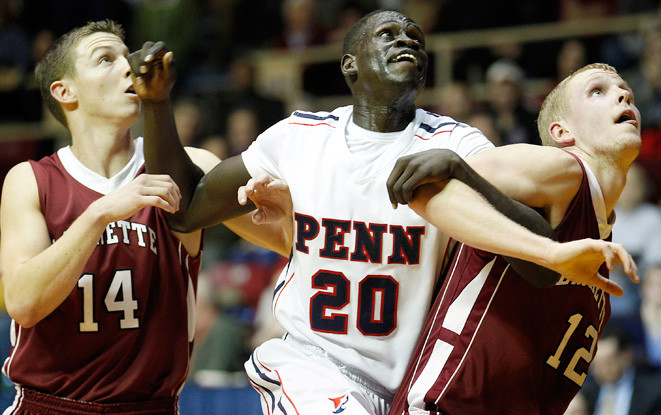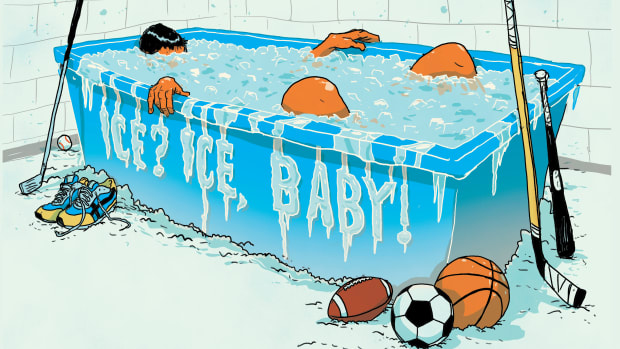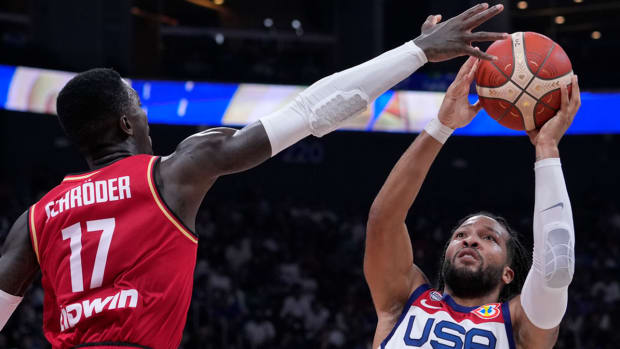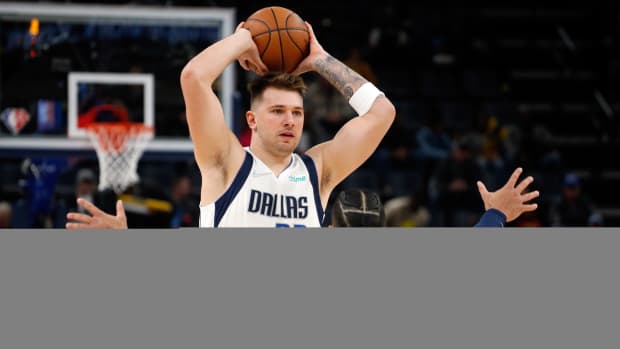After fleeing from war-torn Sudan, Dau Jok becomes a leader at Penn
Jok wanted to visit his father's grave in Mayen Thon. His relatives prayed that he wouldn't, and he listened. Just one year into South Sudan's independence, the village had again been swallowed by the tribal and ethnic warfare that has plagued the nation since its birth -- most gruesomely pitting Africans from the south against Arabs from the north. So Jok brought his father's spirit back to the University of Pennsylvania, along with a realization: "Everyone's hope is on me finishing school."
Months later, he sits in the stands of the historic Palestra, wearing a basketball jersey and gym shorts. Here, he is nothing but a junior shooting guard on a 3-15 team. But Jok leaves little doubt that Penn has changed him, or at least allowed several parts of him to flourish: The activist, whose Dut Jok Youth Foundation, boosted by a $10,000 grant from winning the Davis Projects for Peace award as a freshman, aims to educate Sudanese youth through sport; the thinker, who studies Martin Luther King Jr. and Sun Tzu in his free time and regularly engages in hours-long debates with his peers; and the tireless worker, who shoots a jumper for every bullet he would have shot had he not fled for Iowa at age 11.
Now the boy who learned to write by scraping dirt with sticks is taking Linguistics, Logic and Global Justice. Now the visionary whose goal is "to be the most influential person in South Sudan" is receiving the education and developing the connections to inch toward it. And instead of tribesmen, he has teammates to do battle with, to rally and protect.
The doubts of others have fueled him since the kids in sixth grade teased him for the way he looked, dressed, spoke and ate, since the ESL teachers skipped him during reading class. Back then, he picked up a basketball to beat his tormenters at their own game and studied until 3 in the morning to learn English. That commitment to excellence continues today.
How else could a basketball player inspire the coach who plays him 12.9 minutes per game to say the things that Jerome Allen says of Jok -- not to mention name him a captain?
"The title goes with what he's done since his first day on campus. It fits with who he is," says Allen. "The university has benefited more from him being here than he has from being at the university."
*****
Basketball came at the perfect time for Jok, a gem he uncovered after his grandmother found a sponsor for him, his mother and brother in Des Moines' Saint Ambrose Cathedral. In every sense, the sport was perfect. Here was a game in which its defining skill, shooting, could be mastered through repetition. All Jok had to do was walk the three miles to the YMCA in the chilly Iowa winter, then wait 20 minutes inside until he could feel his hands again. At his peak, before he averaged more than 14 points per game as a junior at Roosevelt High, he stayed for eight hours each day.
"I felt like I had a purpose," he says, recalling his Sudanese peers who ended up in gangs or jail while he shot his way onto the mid-major recruiting radar.
But the game was never the end, only the means. It allowed Jok to distract himself from life's pressures. What is my purpose in the world? If I die today, what will people say about me? "I'm always thinking," he says. "Basketball's probably the only time I'm not thinking."
Even today, three years after the scholarship offer that changed his life, the anger still hibernates within him. The other side of Jok -- the one that compelled him to wrap his six-year-old fingers around an AK-47 moments after his slain father was carried home -- still wages war with the man he's become.
"You need to stay close to the foundation," the man in him reasons. He talks of pursuing a Master's and a PhD in education, and landing a job that would give the foundation a financial backbone. "You were chosen to be in this position not for you, but for other people."
"Why is it that I was chosen?" rages the boy, the one birthed by South Sudan's ruthlessness, the reminder that this 20-year-old who speaks like a politician and thinks like a philosopher grew up in a breeding ground of violence. His childhood days were routinely interrupted by the growl of Antonov bomber planes, the cue to run for cover in holes dug into the soil. His playtime consisted of sneaky ventures into his father's gun storage room to fiddle with his choice of 400-some pieces of bone-rattling steel.
Four months after he committed to Penn, he nearly snapped. His grandfather, Gok Dinka paramount chief Jok Dau Kachuol, had been killed in crossfire. When he heard the news on that Saturday in February before basketball practice, he curled up on the armrest of his home sofa and froze. Five ... 15 ... 30 minutes passed. Over a decade of loss, he had grown immune to bad news; death had lost its gravity. "You hear something that gets you angry, but emotionally you're numb. It's hard to explain," he says, for once in search of words. "I didn't not feel emotion. ... You do. ... But after you've been around it so much, there's nothing that sticks out.
"But my grandfather's death brought everything back. My dad's death -- everything."
The tears rushed back, too, along with the most enraging of thoughts. That his people are dying of starvation and disease. That they have no clean water. That his tribe has no leader. And, most of all, that he could do nothing about any of it. He vowed revenge.
Then he thought of Penn, and the education it would provide him. He thought of those responsible for his country's misfortune, and how they would sleep well regardless of his feelings. And he forgave them, or at least "tricked" himself into doing so, so that he could sleep.
He still thinks about retaliating. For his most recent answer to the impossible questions -- how to enact change without being viewed as the enemy; how to solve problems peacefully in a nation that only knows violence -- he turned to Malcolm X. "By any means necessary," he asserts, his mind stirring after another afternoon practice. "The dream is to do it without violence. Just don't get it twisted. If you want to fight, as a last resort..." He smacks the back of his right hand into his left palm with each word. "We will fight."
When reason takes over, he thinks of his family, of his education, of how much he has to lose. "I have other ways of fighting back," he concedes. "I'm always finding ways."





